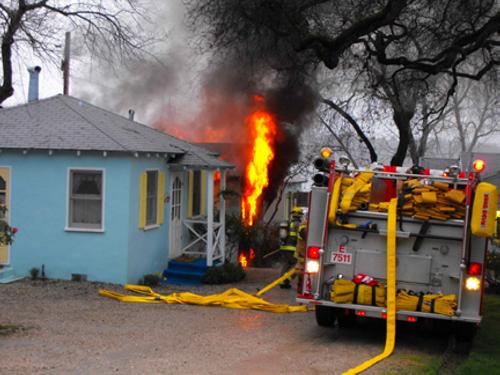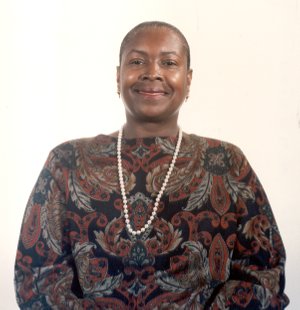- Elizabeth Larson
- Posted On
Students voice concerns as Kelseyville Unified considers its budget

KELSEYVILLE – Following a district school board meeting earlier this week to accept an interim budget, a group of Kelseyville High students held a march to their district office to share their own concerns about what the future holds for education.
It was at about 1:15 p.m. on Friday that the group of well over 100 students – carrying a banner that said, “We have voices. Learn to listen” – marched down the hill from Kelseyville High and approached the Kelseyville Unified School District Office.
The sentiment among the participating students was that they wanted to protect their education. One female student urged her peers to show respect to administrators and teachers, and they could expect respect in return.
District Superintendent Boyce McClain, who has headed the district for nine and a half years, was there to welcome the students and speak with them.
Before the students appeared, McClain told Lake County News that his office had been notified that a group of about a dozen students might appear, so he appeared surprised when it was dozens more.
It quickly became evident that they couldn't all fit in the district's board room, so together students and administrators walked back up to the high school, and were joined along the way by more students, so that the group was approaching about 200 people.
McClain and high school Principal Matt Cockerton decided to have the group move to the gym, where they could use the sound system. There, they were joined by still more students and about a dozen teachers.
Administrators assured students that they were aware of their concerns. McClain told students he would hold an assembly to discuss the budget issues on Tuesday.
In an interview with Lake County News after the demonstration, McClain said he had received letters from students who were concerned about losing sports and educational programs, and increasing class sizes, among other things.
“These are great kids,” said McClain. “They want to be able to be heard and I just deeply respect that.”
He added that he wants the students to know that he hears their concerns.
The Tuesday assembly, McClain said, will give him a chance to explain the situation to students fully, and give them accurate information. “I just want to show them that we'll be fine.”
“I think it's great that they're involved and concerned about what's happening in the education system,” school board member Gary Olson said of the students.
Olson said education is struggling statewide.
It's true for districts across the rest of the county as well. This week, the Konocti Unified School District held more community meetings to take input on several options to save that district money in the face of deep cuts, with proposals including closing some middle schools. Konocti Unified's board is set to meet March 4 to look at the issue further.
Elsewhere, districts are looking at cutting programs and possibly more teaching positions.
Lake County Superintendent of Schools Dave Geck said the situation countywide is looking tough.
“Across the county, all districts are looking at where they can effect cost savings as far away from classrooms as possible,” he said.
Based on an initial analysis, Geck said the county's schools are looking at $5.7 million in cuts from now through the 2009-10 budget year, for a 16.6 percent reduction.
He estimated all of the schools will have to lay off personnel. When 85 percent of education budgets are personnel, and cuts are estimated at 20 percent, “There's no way to avoid people's lives getting impacted,” Geck said.
Last year was the first time in Geck's 10 years at the Lake County Office of Education that they had layoffs. Looking toward the year ahead, he said, “I don't look forward to having to do that.”
An ongoing dialogue
Concerns for students and staff alike had arisen earlier in the week, when the Kelseyville Unified board convened for a special Monday meeting to discuss the budget situation.
In the wake of the state budget's passage, McClain said district administration put a budget presentation together in about four hours on Monday for the district board to consider. He called it “a very quick look” at the coming year's budget.
At that meeting, the Konocti Unified Teachers Association expressed their concern about the potential budget, said union President Rico Abordo, an English teacher at Kelseyville High.
Abordo said the union made clear its ideas about where it would like to see the district's money spent, urging against the district keeping an a fiscal reserve of more than 5 percent.
Anything over that amount should be spent on students and employees, Abordo said. “We're an educational institution, not a savings institution.”
Abordo said the union and the district are taking part in an ongoing conversation, and he said those initial concerns the union discussed Monday already have been addressed. He said he feels there has been a healthy dialogue between the board of trustees and the bargaining unit.
Olson said trustees needed to approve an interim budget by March 15 as required by the state. “Nothing of what we approved is set in stone. It's based on what we think might happen. It's sort of a worst case scenario.”
In normal years, the interim budget has never been met with much attention, said Olson. “We're not in normal times at all.”
Abordo said the district has been run extremely well over the years, and credited McClain for his work to keep Kelseyville Unified fiscally solvent, and for dealing effectively with controversial issues, such as the changing of Kelseyville High's mascot from an Indian to a knight.
“We're probably in better position than most other districts,” Abordo said of the fiscal situation.
Olson also credits McClain for keeping a good relationship going between the union and the district.
“We've worked real hard to pay the teachers as much as we can afford to,” he said, adding that the district offers its teachers the best benefits package of any group of teachers in the county.
Morale in the district was the highest it's been in a long time until the economic crunch started, said Olson.
Kelseyville Unified's situation looks better than some
McClain said the school district's budget actually is looking a lot healthier than they initially expected. They're not facing a big midyear cut, and have implemented a spending freeze.
Olson said last year the district lost close to 40 classified employees, many of them part-time, and 13 teachers. He attributed much of the district's budget situation to “the elephant in the room” – declining enrollment.
He said he understands personally what teachers are going through – his wife is a teacher at Riviera Elementary, and she went from a full-time to a half-time position last year.
Looking ahead, district officials had expected as much as a $1.4 million cut to their $15 million annual budget for the 2009-10 fiscal year, but McClain said he's since penciled it out and that amount comes in under $1 million.
McClain, who said the district has a $1 million a month payroll, has four teachers retiring, and that may mean that the district can shift assignments and not have to lay off any teachers this year.
Abordo said that layoff notices are due on March 13.
He said that on Friday the high school librarian retired and that means the junior high school librarian will have to do double duty over the rest of the year. As a result, the high school library will be closed two and a half days a week.
Over the next two weeks, as districts finalize their budgets, Geck said he expects tough decisions to be made.
Local districts and government agencies also are meeting to look at ways they can make joint purchases, share resources and be more cost-effective in their operations.
“The piece that's really a wild card that's still being defined is the flexibility that district will have inside of their categorical programs,” said Geck, explaining that the flexibility came out of the state's budget compromise.
Categorical funding is that which comes from state and federal governments and is targeted for specific programs and purposes, according to the Education Data Partnership. The use of funds usually is restricted.
“The devil is definitely in the details,” said Geck.
Harold LaBonte contributed to this report.
E-mail Elizabeth Larson at This email address is being protected from spambots. You need JavaScript enabled to view it..

{mos_sb_discuss:2}













